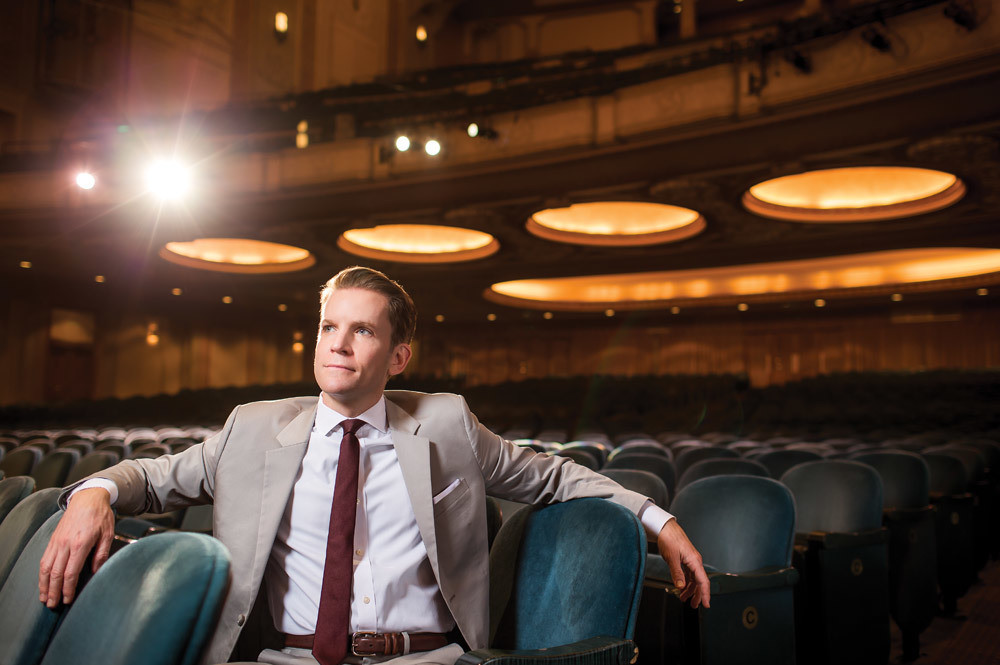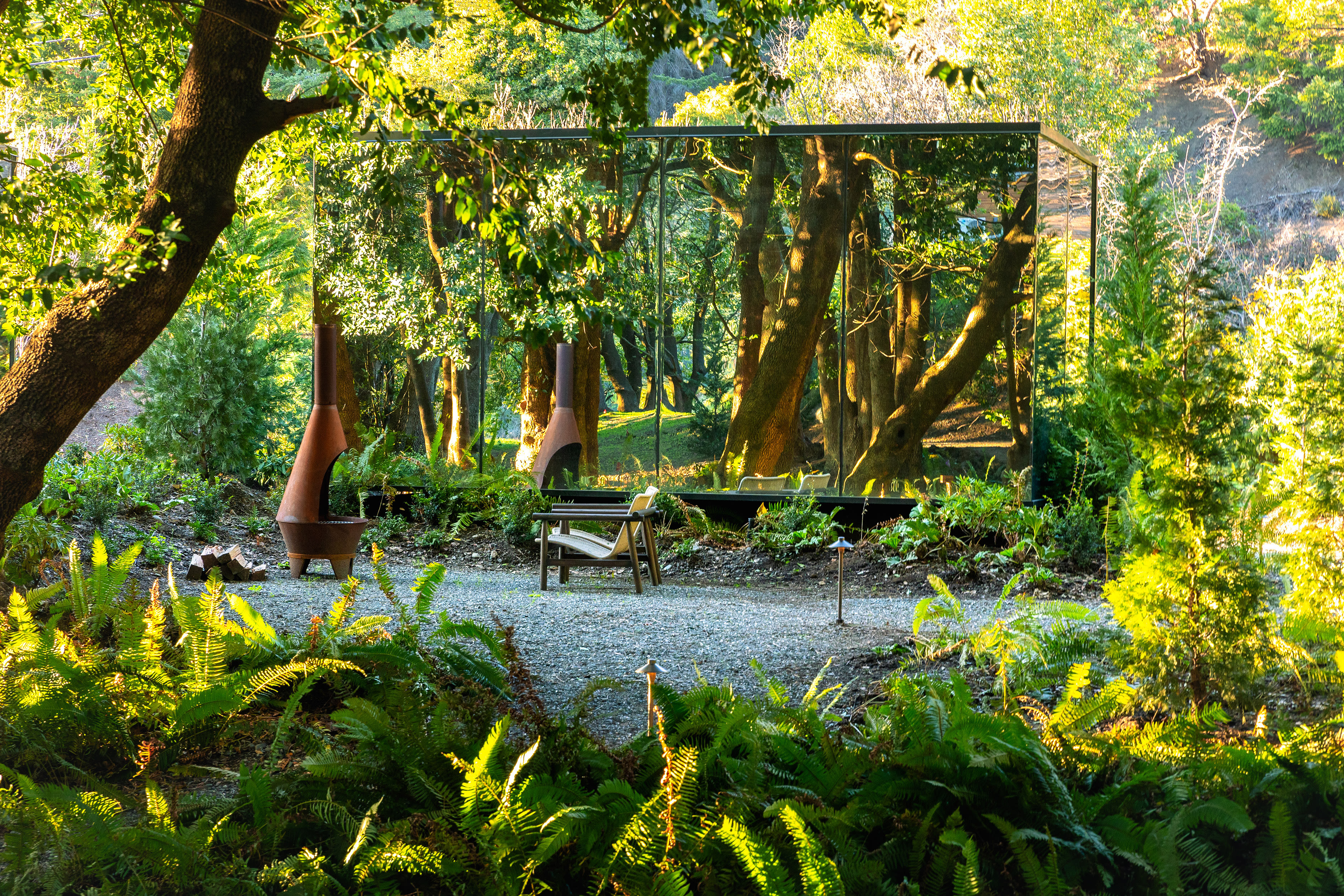Bach to the Future? The Oregon Symphony Looks for New Horizons

Scott Showalter at the Arlene Schnitzer Concert Hall
Image: NASHCO PHOTO
The lights go down in the Arlene Schnitzer Concert Hall and a hush descends on 2,700 audience members. On stage, 76 black-clad musicians await. A trim fellow in a sharp suit strides out in front: Scott Showalter, the Oregon Symphony’s CEO and president, there to introduce what he calls “your symphony.” Showalter, who took the organization’s reins in July 2014, came to Portland from the LA Philharmonic, where he served as vice president for development. The top job here had sat empty for almost two years as an eight-person search committee ran through dozens of candidates.
Thomas Lauderdale, a symphony board member, met Showalter during a Hollywood Bowl performance by Pink Martini, Lauderdale’s legendary jazz/pop/classical band. The Illinois native offered what Portland sought: fundraising chops, an arts background, a front man’s charisma, and a knack for backroom relationships. Thus began nine months of courtship. “The task became, could we attract him?” says board member Walt Weyler.
In the end, music itself sealed the deal. “I would not be here if it weren’t for the quality of the orchestra,” says Showalter, a classically trained musician whose grand piano occupies prime real estate in his 11th-floor Pearl District apartment.
The Oregon Symphony is, indeed, rich in reputation. Four years ago, for example, New Yorker critic Alex Ross raved about the ensemble’s “shattering force.” Oregon ArtsWatch’s Brett Campbell, who also covers classical music for the Wall Street Journal, calls it “very technically accomplished.” One missing piece, Campbell adds, is the artistic vision to attract national buzz of the sort currently enjoyed by counterparts in Seattle and Baltimore.
To that end, Showalter is brimming with ideas. He just needs the money to fund them. The year before he arrived, the symphony—though debt-free—cut pay and pared back productions, touring, and recording. “I didn’t come here to balance the budget,” he says. “I came here to grow.”
That growth is already visible. The 2014–15 season set a record for ticket sales, on track for more than 160,000 at press time, compared with just over 154,000 last year. In the first half of 2015, the total number of donors increased substantially over the same period the year before, from 3,664 to 4,233. April’s black-tie gala raised $700,000, the event’s largest haul ever.
All good news. But current stats only hint at deeper challenges. A time-crunched society means endless
competition—from Portland’s other cultural organizations, from the food scene, from Netflix—for revenue-generating rumps in seats. Meanwhile, classical music’s core audience is notably white of hair (as well as simply white). How can the symphony keep itself alive and its 76 salaried musicians on the payroll?
“I didn’t come here to balance the budget. I came here to grow.”
“Here’s what I know,” Showalter says. “We can’t continue to do things the way they always have been done.” It starts with programming. Last season, the orchestra played alongside Boyz II Men, a Led Zeppelin tribute band, and the Cherry Poppin’ Daddies. The 2015–16 season, which begins in September, includes “The Music of Pink Floyd,” music from Back to the Future, and a collaboration with country star Sara Evans alongside Mozart’s Piano Concerto no. 27.
Showalter, 42, is also keen to extend the symphony’s demographic reach. School buses regularly line up outside the Schnitz, and the orchestra has traveled to libraries and even correctional facilities. He talks of other possibilities: a Thursday-evening after-work concert, a partnership with the Seattle Symphony, or a performance cycle themed around issues like the environment or marijuana legalization.
When it comes to making the possible actual, though, Portland offers some distinctive stumbling blocks. Showalter has discovered that moneyed Portlanders, unlike rich Angelenos, seldom compete to out-donate one another—“which is really endearing when you’re one of the community and we’re all weird and green together,” he says, “but sometimes you want to play that card.”
He does note a fierce civic pride: the ownership Portlanders take in a neighborhood craft brewery or the coffee shop down the street that nobody’s ever heard of. Maybe, he muses, the Oregon Symphony is one such treasured secret. “But,” he says, “I don’t want it to be a secret.”
In corporate-speak, Showalter wants to build the brand: his goal is for all Portlanders, and all Oregonians, to feel ownership of the symphony. “I want people to think the symphony is cool, because it is,” he says. “And if people are intimidated by going to see Haydn and Mendelssohn and Brahms, they can come watch circus acts on stage, or gospel music.” He smiles a high-wattage smile that can make a friend of a high-rolling donor or a working musician. “It’s not just your grandpa’s symphony. It’s yours. It’s your symphony.”
If he pulls off that ambition, Scott Showalter will deserve an encore.




